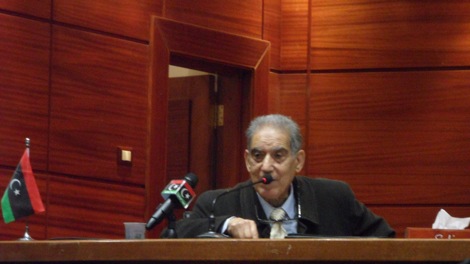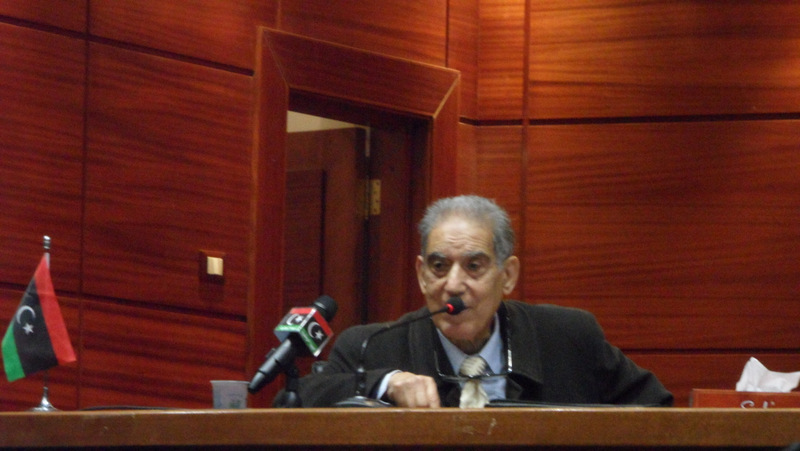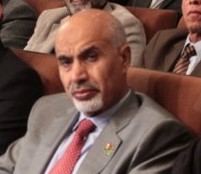By Valerie Stocker.

Tripoli, 5 January:
The revamped Libyan Center for Archives and Historical Studies in downtown Tripoli hosted a reading, “Echoes on . . .[restrict]the beaches of longing”, from one of the Libya’s elder poets this week.
Veteran poet Abderraouf Abdelmajid Bin Al-Amin came to share some of his more recent work in Arabic, drawn from his repertoire of thousands of verses, all a product of his lifelong obsession with words and their origins.
Attendance was low, but the warm welcome Bin Al-Amin received from the audience show he is a well-respected figure among the elder generation of Libyan intellectuals.
In the poems he recited, most of which he had written over the past six years during a longer stay in his home country after decades spent abroad, the poet speaks of the attachment to one’s homeland, faith, the destiny of peoples, the tumultuous history of the Arab nations and the difficulty of exile and estrangement, but above all, of love, yearning and nostalgia.
“Many people don’t recognize it but in my view love is the essence of poetry and all other themes derive from it”, the poet later told the Libya Herald.
Born in 1939, Abderraouf Bin Al-Amin left Libya in the 1950s to study in Egypt and Britain and then settled down in Germany in 1958, where he has spent most of the past 50 years and which has become his second home.
The poet has mastered not only classical Arabic but also old and modern German, proof of his keen interest in languages. His style of writing in German is unique, as he uses modern language and vocabulary while remaining faithful to classical rhyme schemes.
Sometimes, he says, German newspapers would publish poems of his, but he never attached much importance to fame and reward.
Despite his long absences, Bin Al-Amin never lost touch with his country of birth, and regularly returned to Libya. Six years ago, however, he decided to relocate to Tripoli permanently, where he composed over 2,500 verses in Arabic and worked on his research in linguistics.
But maintaining his ties to Libya was not always an easy task: in the 1980s, like many other Libyan intellectuals, especially those who lived abroad, Bin Al-Amin learnt that his name was on a regime blacklist and that his life was in danger.
Fellow exiles were injured or assassinated by Qaddafi’s hitmen, but he says he managed to survive thanks to precautions he took for his protection.
At the same time, Bin Al-Amin’s experiences also show the former regime’s ambiguous attitude towards Libyan writers and artists, whom it relied on to provide the intellectual underpinning for the “Al Fateh Revolution” but whom it also despised for their independent thought.
In the early years after the 1969 coup, Qaddafi and his comrades attempted to co-opt Libyan intellectuals, while ostracising and persecuting those who refused. Bin Al Amin’s earliest works were published in Libya, both before and after the regime came to power.
Decades later, the end of Libya’s international isolation and the partial liberalisation brought about by Saif Al Islam’s guidance allowed for limited criticism of the outdated system. A few years ago, the poet was even given the chance to give a reading at the former Center for Green Book Studies in Tripoli.
In a thinly-veiled critique of the sham reforms of what was then known as “Libya of Tomorrow” (Libya Al Ghad), he asked rhetorically: ‘how can you reform a system of oppression, where people have not awoken from the slumber of indifference?’ But by this point, the regime was no longer worried by mere words and the poet faced no consequences.
Over the last decade, much of Abderraouf Bin Al-Amin’s work focused on historical linguistics as he researched the links between ancient Germanic languages, whose origins date back to the classic Iron age, and languages spoken nowadays across North Africa and the Middle East all the way to the Indian subcontinent, including the Semitic, Afro-Asiatic and Indo-Iranian language families and branches.
As a native Arabic speaker, he was surprised to discover numerous similarities that run much deeper than previously thought, and that he thinks could change the way that history is taught.
The poet is planning to publish the results his 20-year research, which he believes will shake up conventional theories.
Last Wednesday’s poetry recital was one of many literature readings, academic lectures and conferences organised by the Centre for Archives and Historical Studies, usually announced on its website or in the media.
Unfortunately, few people in Libya seem to be aware of, or even interested in, these events. Established in 1977 as the “Libyan Jihad Centre”, the institution may still bear the stain of having conducted politically biased research as dictated by the guidelines set out by the jamahariya.
But critics should remember that academic freedom of any kind was nonexistent at the time, and that the centre did make a significant contribution to the documentation of Libya’s past.
In particular, the oral history project carried out by the centre, interviewing participants in the struggle against the Italians and its highly censored documentation of the monarchy years are of unique historical value. [/restrict]










